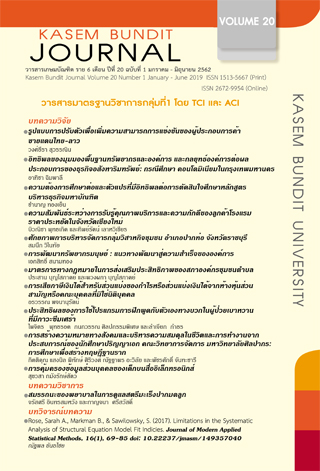การสร้างความหมายทางสังคมและบริหารความสมดุลในชีวิตและการทำงานจากประสบการณ์ของนักศึกษาปริญญาเอก คณะวิทยาการจัดการ มหาวิทยาลัยศิลปากร: การศึกษาเพื่อสร้างทฤษฎีฐานราก
คำสำคัญ:
ความสมดุลในชีวิตและการทำงาน วัฒนธรรมองค์การ จุดยืนและความคาดหวังของชีวิต ทฤษฎีฐานรากบทคัดย่อ
การวิจัยนี้เป็นการวิจัยเชิงคุณภาพ มีวัตถุประสงค์เพื่อศึกษา การให้ความหมาย แนวคิดและแนวทางการสร้างและบริหารความสมดุลในชีวิตและการทำงาน จากประสบการณ์ของนักศึกษาปริญญาเอก คณะวิทยาการจัดการ มหาวิทยาลัยศิลปากร ผลจากการวิจัยนี้เพื่อสร้างทฤษฎีฐานราก เก็บข้อมูลด้วยวิธีการสนทนากลุ่ม และการศึกษาข้อมูลทุติยภูมิที่เกี่ยวข้อง ผลการศึกษาพบว่า แนวทางการสร้างและบริหารความสมดุลในชีวิตและการทำงาน ได้แก่ การจัดลำดับความสำคัญของงานและสิ่งต่าง ๆ การปรับตัว และปรับทัศนคติเชิงบวก การสร้างสภาพแวดล้อมและบรรยากาศวัฒนธรรมองค์การ การหาแนวทางในการสร้างความสุข และการกำหนดจุดยืนและความคาดหวังของชีวิต
เอกสารอ้างอิง
Chantavanich, Supang. (1997). Qualitative Research Methods. 7th edition. Bangkok: Chulalongkorn University Press.
Creswell, J.W. (1998) Qualitative inquiry and research design: Choosing among five traditions. London: Sage.
Denzin, N. K. & Lincoln, Y.S. (2011). Handbook of Qualitative Research (4 edn.). Thousand Oaks, CA: Sage.
Greenfield, C. and Terry, M. (1995), Work/life: From a set of programs to a strategic way of management. Empl. Rel. Today, 22: 67–81. doi:10.1002/ert.3910220308.
Hyman, J., & Summers, J. (2004). Lacking balance? Work-life employment practices in the modern economy. Personnel Review, 33(4), 418-429.
Kanokkanjanarat, Teera. (2013). SME’s Compass: Work-Life Balance adjusts the concept for life and work. Data is available on May 14, 2560. Access is available from http://www.thairath.co.th/content/370700.
Keawkiatkul, Kasemsit (2008). Work-life balance. Journal of Human Resources. 4(January - June) 2008.
Liwsakyul-Kulthorn, Hatai-Thip (2555). The study of factors affecting the balance of life and work of the Deposit Protection Agency. Master Thesis, University of the Thai Chamber of Commerce.
Merrill & Merrill (2003). Life Matter: Crating a dynamic balance of work, family, time and money. New York: McGraw-Hall.
Murphy, L. R. (1995). “Managing Job Stress and Employee Assistance/ Human Resource Management Partnership”. Personnel Review. 24:43-86.
Nubud, Jutaporn (2554). The study of the balance between life and work at Vibhavadi Hospital. Master's thesis, Thammasat University.
Prebbi, M.& Wagstaff, R (2005). Work-life balance: A resource for the state services. New Zealand: State Service Commission.
Phothiva,t Kanya. (2005). Transformation Leadership in Primary School: A Study to Build Grounded Theories. Dissertation Thesis. Khon Kaen University.
Siriwong, Pitak. (2004). "The Grounded Theory of Research Methods for Developing Theories in Country Development," Journal of Political Science (19): 1 April - September, 2004. Glaser, Barney G., and Strauss, Anselm. L. The Discovery Grounded Theory: Strategies for Qualitative Research. Aldine, pp. 271. 1967.
Tepwan, Pichit. (2011). Strategic Human Resource Management: Concepts and Strategies for Competitive Advantage. Bangkok: SE-EDUCATION.
Thai Health Promotion Foundation. (2554). The 8th happiness report. Retrieved on May 14, 2560. Accessed from the Health Promotion Foundation (Public Health). www.thaihealth.or.th.
Voydanoff, Routledge., P. (2005). Toward a conceptualization of perceived work‐family fit and balance: a demands and resources approach. Journal of marriage and family, 67(4), 822-836.
Van Manen, M. (2016). Researching lived experience: Human science for an action sensitive pedagogy.
ดาวน์โหลด
เผยแพร่แล้ว
รูปแบบการอ้างอิง
ฉบับ
ประเภทบทความ
สัญญาอนุญาต
Any views or opinions expressed in this issue of the Kasem Bundit University Journal are those of the authors alone and do not necessarily reflect the views or opinions of Kasem Bundit University or the editors.







